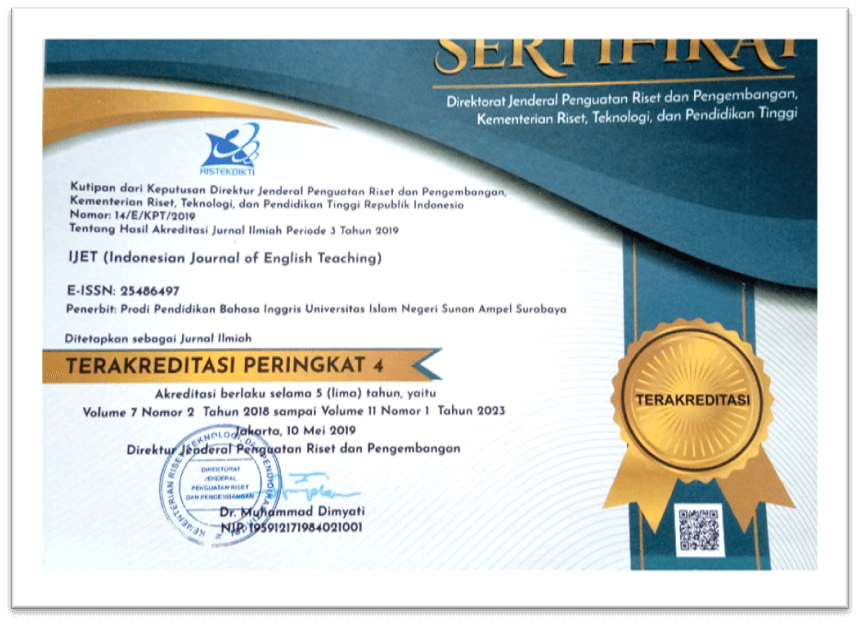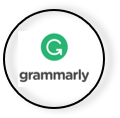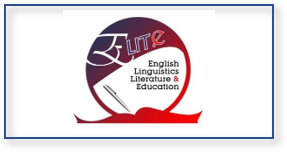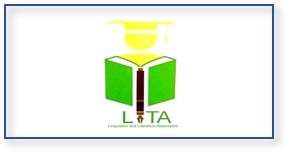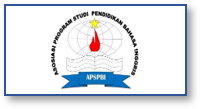Students’ Digital Reading Habits For Digital Academic Text And Their Achievement
Digital Reading Text
DOI:
https://doi.org/10.15642/ijet2.2023.12.1.73-82Keywords:
achievement, digital academic text, digital reading, reading habit.Abstract
Abstract. The role of digital media is much useful for contributing to creating reading habits through the benefit of technology. Technology has grown up these days, the young generation is living a life in the modern area, where they could get their education everywhere not bound to a classroom. That’s the way the promoting of to create a literate society or reading habit in this modern era is might be important for EFL to study more easily with creating a literate society through reading cause reading is the identification of the symbols and the association of appropriate meaning with them. This study describe about what is the level of students’ digital reading habits for academic text with descriptive quantitative and the correlation between students’ habits in reading digital academic text and their achievement, is there any correlation or not. 95 students who have done with their reading material for academic text in 4th semester, only 39 students were include for this research. 31 item questionnaire was distributed to obtain data about students’ reading habit in digital academic text and their achievements. For the second instrument is based from the final course reading exam. The first result in student’s reading habits in digital academic text have an average result habits in reading or low habits in reading based on the SPSS calculation for the descriptive statistic, it means there are some other aspects of student’s reading habits in this private university by comparing for the previous study. Afterward the researcher analyze the data after collecting it. The data shows that students’ reading habits in digital academic text don’t affect on student achievement, it means that there is no significant correlation between the students’ reading habits in digital academic text and their achievement in the 4th semester at the private university of Malang.
Downloads
References
__Van_Wesermael_, A., & Sangkaeo, S. (1999). PUB TYPE Opinion Papers (120) Speeches/Meeting Papers (150) EDRS PRICE MF01/PC01 Plus Postage. DESCRIPTORS Foreign Countries; *Library Role; *Library Services; *Reading Habits; *Reading Programs IDENTIFIERS Asia (Southeast); Association of Southeast Asian. 2.
_The_Impact_Internet_and_Digital_Media_on_Reading_Habit (1). (n.d.).
Allington, R. L. (2014). How Reading Volume Affects Both Reading Fluency and Reading Achievement. International Electronic Journal of Elementary Education, 7(1), 95–104.
Barbe-clevett, T. (2002). Barbe-Clevett, Tara; Hanley, Nancy; Sullivan, Peter Improving Reading Comprehension through Metacognitive.
Geske, A., & Ozola, A. (2008). Factors Influencing Reading Literacy At the Primary School Level. Problems of Education in the 21st Century, 6, 71–77.
Iftanti, E. (2012). A Survey of the English Reading Habits of EFL students in Indonesia. TEFLIN Journal, 23, 149–164.
Kavale, K. (1982). Meta-analysis of the relationship between visual perceptual skills and reading achievement. Journal of Learning Disabilities, 15(1), 42–51. https://doi.org/10.1177/002221948201500110
Kucirkova, N., & Littleton, K. (2016). The digital reading habits of children. A National Survey of Parents’ Perceptions of and Practices in Relation to Children’s Reading for Pleasure with Print and Digital Books, February, 1–72.
Kurniasih, N. (2016). Reading Habit in Digital Era: Indonesian People do not Like Reading, is it True? Revista CENIC. Ciencias Biológicas, 152(3), 28.
Muhid, A., Amalia, E. R., Hilaliyah, H., Budiana, N., & Wajdi, M. B. N. (2020). The effect of metacognitive strategies implementation on students’ reading comprehension achievement. International Journal of Instruction, 13(2), 847–862. https://doi.org/10.29333/iji.2020.13257a
Oluwayemisi Florence, F., Adebimpe Adesola, O., Alaba, B., & Muinat Adewumi, O. (2017). A Survey on the Reading Habits among Colleges of Education Students in the Information Age. Journal of Education and Practice , 8(8), 106–110.
Palani, K. K. (2012). Promoting Reading habits and creating literate society. Journal of Arts,Science & Commerce, III(2), 90–94.
Rachmativani, Z., & Supeno, S. (2020). the Effects of Reading Habit and Grammar Mastery Towards Student’S Reading Comprehension. INFERENCE: Journal of English Language Teaching, 3(2), 159. https://doi.org/10.30998/inference.v3i2.5993
Shimray, S. R., Keerti, C., & Ramaiah, C. K. (2015). An overview of mobile reading habits. DESIDOC Journal of Library and Information Technology, 35(5), 343–354. https://doi.org/10.14429/djlit.35.5.8901
Sulaiman, M., & Harpiansi, H. (2018). The Correlation Between Reading Habit and Students’ Reading Comprehension Achievements. Alsuna: Journal of Arabic and English Language, 1(2), 78–86. https://doi.org/10.31538/alsuna.v1i2.87

